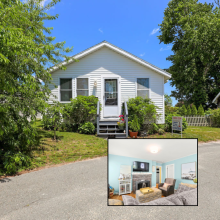Board of Health reconsiders motel stay limits
The Board of Health decided to reexamine aspects of its plan to crack down on long term stays at Wareham motels after motel owners — and their legal representation — expressed concerns at a Jan. 19 meeting.
Since May 2016, the town has had limits on the amount of time a guest can remain in a motel or hotel room. As of 2017, the board had imposed a 21-day limit on how long a guest can remain in a motel or hotel room and a 90-day limit on stays in efficiency units (which contain some sort of kitchen element).
With rental housing scarce and expensive in the area, some people live in motels for long periods of time.
“We know there are people that are living in these motels for years, not months,” one of the board members said.
When passing the regulations in November, board members said they hoped limits on stays would ultimately create better living conditions for the homeless and spur motel and efficiency unit owners to improve the quality of the rooms.
But Long-time motel residents and motel owners have repeatedly said that stay limits will increase homelessness, as many people who live in motels cannot afford other living accommodations.
Motel owners at the Jan. 20 meeting widely took issue with the stay limit provisions for other reasons, asserting that they interfered with their ability to host traveling workers — like bridge painters and nurses — that might need to stay in town longer than three weeks.
When asked why those kinds of guests couldn’t rent efficiency units, Attorney Mark Boudreau, who spoke on behalf of Atlantic Motels, stated that the only lodging place in town that offered such units was the Marriott, which surprised some board members.
Atlantic Motels Owner Bharat Patel said that he has considered adding efficiency units but decided against it because of fire safety issues. He added that many short-term workers prefer to get takeout rather than cooking anyway.
But the issue that seemed to bother motel owners the most was a provision that would require them to send in monthly reports including not only guests’ names and check-in and check-out dates, but also photocopies of their photo ID cards.
The provision was added to keep motel owners “honest” about how long guests were staying, a board member said, but lawyers representing the motels said such requirements could be unconstitutional.
Boudreau cited a 2015 U.S. Supreme Court case — ironically named City of Los Angeles v. Patel — that struck down a provision requiring L.A. hotels to give police access to their guest logs at any time without need for a warrant. The law was found to violate the fourth amendment, which protects against unwarranted search and seizure.
“I don’t think this is a constitutional provision,” he said.
Another attorney, Christian Akers, who represented Rosewood Motel at the meeting, said that the photo ID requirement would also create a liability for hotels because they would then be responsible for the security of those ID scans and for safely transferring them to the board.
“There can be liability to a corporation if personal information gets into the wrong hands,” he said. “You’re putting them at risk of additional liability.”
The two attorneys also drew parallels between the ID requirements to use hotels and voter ID laws that have been seen as discriminatory because of the outsized effect they have on voters of color, who are statistically less likely to have a government ID card.
Board members said they took these concerns seriously and would consider revisions to the proposed regulations, under consultation from Town Counsel, including removing the ID requirement, creating a carveout for traveling workers and rewording stay limits to allow repeat visits that add up to more than three weeks, so long as they are not consecutive.
“We had such a good intent with this, but it’s just become so complicated,” said Board Member Catherine Phinney. “The basic problem is that people can’t afford housing.”
However, some board members expressed frustration that without access to guest logs, there will be little chance of enforcing the stay limits.













